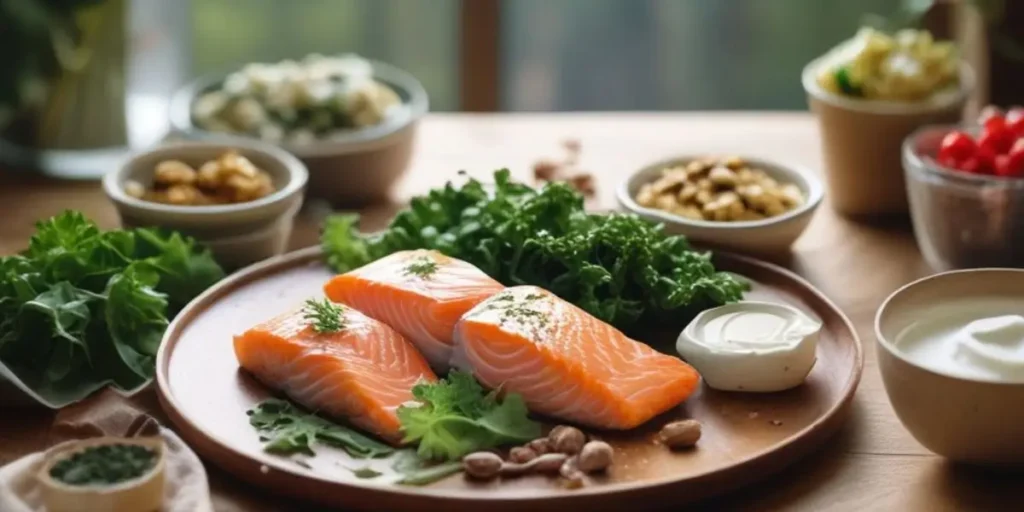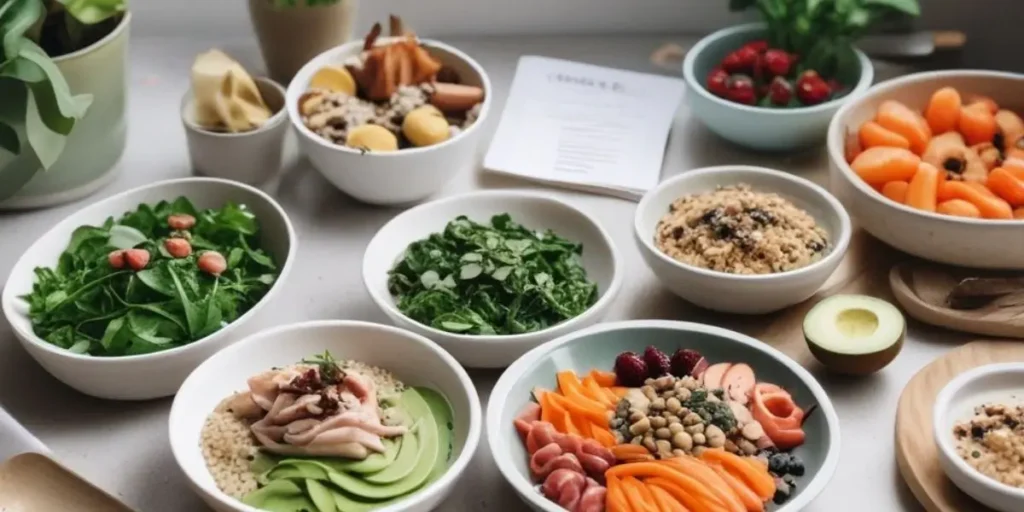Look, we’ve all been there – heart racing, thoughts spinning, that feeling like you’re vibrating out of your skin. While I’m not about to tell you food can magically cure anxiety (if only), these five things can help take the edge off when everything feels like too much. (Foods to Reduce Anxiety)

Quick Links
What You'll Find in This Guide
What foods are good for anxiety? (Foods to Reduce Anxiety)
Salmon – The “Chill Pill” Fish
That expensive-looking fish at the grocery store? Turns out the hype is real. Salmon is packed with omega-3s that help quiet the inflammation-anxiety feedback loop.
What to do when cooking feels impossible:
- Canned salmon mixed with mayo on crackers (fancy people call this “pâté”)
- Microwave a salmon burger while you stare blankly at the wall
Spinach – Nature’s Xanax (Sort Of)
Popeye was right all along. That sad bag of spinach in your fridge has magnesium, which helps your body relax.
For people who hate salads:
- Throw it in your pasta sauce – it disappears
- Blend into a smoothie with frozen banana (you won’t taste it, promise)
Yogurt – For When Your Gut Feels Like It’s Tied in Knots
Anxiety loves to mess with your stomach. Yogurt helps keep your gut bacteria happy, which might keep your brain slightly less panicky.
Zero-effort options:
- Eat it straight from the tub with granola dumped on top
- Frozen yogurt tubes (yes, like the ones your kids eat)
Blueberries – The Snack That Fights Back
These little guys are full of antioxidants that help protect your brain from stress damage. Plus, eating them one by one gives you something to focus on.
When you’re feeling fancy:
- Microwave with a little sugar for instant compote
When you’re not: - Eat straight from the freezer bag
Dark Chocolate – The Guilt-Free Crutch
The darker the better (but let’s be real, anything over 70% is medicine). It’s got compounds that help lower stress hormones.
How to justify eating chocolate:
- “It’s for my mental health.”
- “I read an article that said it’s good for me” (you’re welcome)

The No-Pressure Approach:
- Keep easy versions on hand (frozen, canned, pre-cut)
- If all you can manage is cereal with blueberries? Still counts
- Pair with comfort shows or podcasts – this is a no-judgment zone
Remember: This isn’t about eating perfectly. On bad days, just getting something vaguely nourishing in your body is a win. My anxiety meal? Peanut butter straight from the jar with chocolate chips mixed in. What’s yours?
Frequently Asked Questions
What do eggs do to cortisol?
Eggs help lower cortisol (your stress hormone) because they contain:
Choline: (supports brain function)
B vitamins: (help manage stress)
Protein: (stabilizes blood sugar, preventing cortisol spikes)
Can dehydration cause panic attacks?
Yes, dehydration can trigger panic-like symptoms or worsen anxiety because:
Low hydration = higher cortisol (stress hormone spikes)
Electrolyte imbalance: mimics panic (racing heart, dizziness, shaking)
Blood pressure drops → lightheadedness (feels like panic coming on)
Can low blood sugar cause panic attacks?
Yes! Low blood sugar can feel like a panic attack, causing shaking, sweating, dizziness, and anxiety.
Fix it fast: Eat a quick snack (like fruit or nuts) to stabilize your levels
Does hunger cause anxiety?
Yes, hunger can cause anxiety because:
Low blood sugar triggers stress hormones (like adrenaline), making you feel shaky and anxious.
An empty stomach increases cortisol (the stress hormone).
The brain needs fuel – no food = foggy, irritable, and more prone to worry.
What foods are good for anxiety?
Best Foods for Anxiety (Quick & Easy List)
_ Fatty Fish (Salmon, Sardines) – Omega-3s fight brain inflammation.
_ Nuts & Seeds (Walnuts, Chia, Pumpkin Seeds) – Magnesium calms nerves.
_ Leafy Greens (Spinach, Kale) – Folate boosts mood-regulating serotonin.
_ Berries (Blueberries, Strawberries) – Antioxidants reduce stress damage.
_Dark Chocolate (70 %+ Cocoa) – Lowers cortisol (stress hormone).
_ Turmeric (Golden Milk, Curries) – Curcumin eases inflammation.
_ Bananas – Potassium + B6 help relax muscles.
What helps severe anxiety?
For severe anxiety:
Breathe slowly – Inhale deeply, exhale longer
Get professional help – Therapy and medication work best
Avoid caffeine and alcohol – They increase anxiety
Move your body – Even short walks help
Use grounding – Name objects around you to stay present
If symptoms are severe or dangerous, seek emergency care. Professional treatment is most effective for serious anxiety.
For daily management:
Maintain regular sleep
Eat balanced meals
Practice relaxation daily
What is the 3 3 3 rule for anxiety?
The 3-3-3 rule is a simple grounding technique to help manage anxiety in the moment. Here’s how it works:
Name 3 things you can see (e.g., a chair, your hands, a tree outside).
Name 3 sounds you can hear (e.g., traffic, a fan, birds chirping).
Move 3 parts of your body (e.g., wiggle toes, roll shoulders, stretch arms).
Why it helps: It shifts your focus away from anxious thoughts by reconnecting you to your surroundings and body. Use it anytime anxiety feels overwhelming.
Don’t miss out—follow us on social media for updates:


This site consistently provides quality content.
Keep it up!
thank you